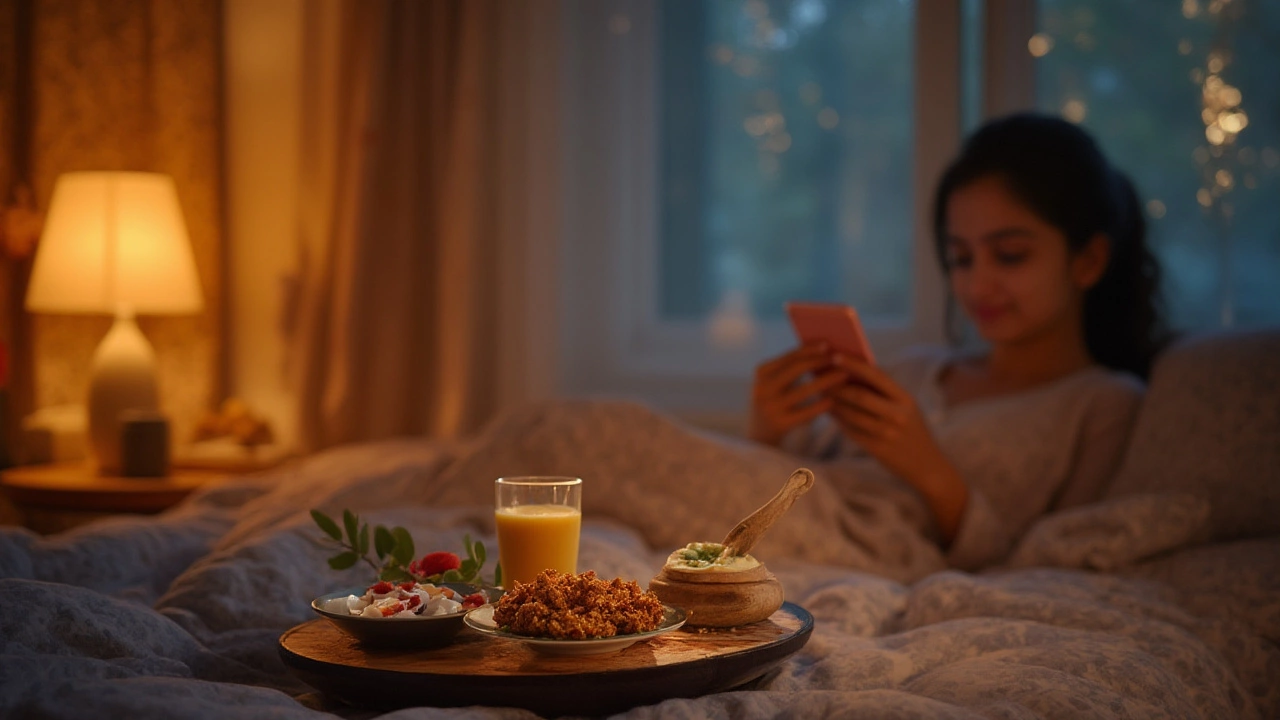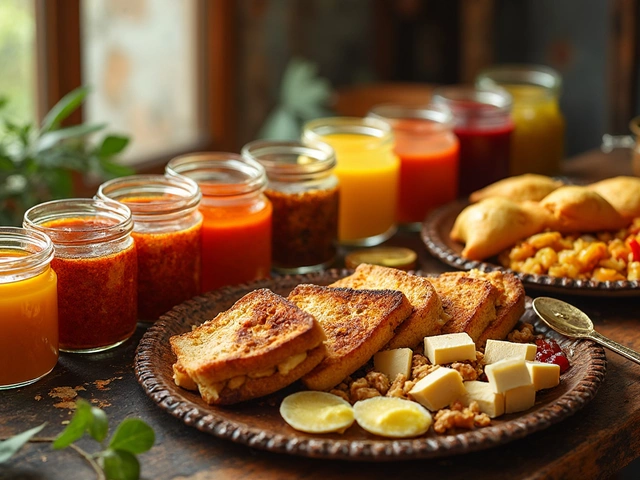Flip the lights off and slide under your covers, but wait—did you just get that familiar nighttime hunger? The time between dinner and sleep can feel like enemy territory for weight loss. You’re not alone. In South Africa, with supper often happening at sunset and noise outside changing with the wind, hunger pangs hit extra hard late at night. Most people believe that eating at night will doom their weight goals, but here’s a truth bomb: What you eat matters more than when you eat.
Understanding Night Hunger and Its Impact on Weight
Your body’s metabolism doesn’t stop when you fall asleep—it actually shifts gears. While resting, your body fixes itself, manages hormones, and, yes, burns calories. According to a study published in the American Journal of Clinical Nutrition, your resting metabolic rate only drops by about 15% at night, compared to daytime. Still, what you eat can influence how you burn fat, feel rested, and even wake up less puffy.
Let’s talk about hunger first. Late-night hunger can spike for several reasons. Maybe your dinner wasn’t satisfying. Maybe you’ve been up binge-watching until midnight (hello, Cozy Cape Town winters and streaming marathons). Stress and sleep deprivation also play their part. Your body releases more ghrelin (the hunger hormone) and less leptin (the “I’m full” hormone) when you’re tired or anxious. That’s why a poor night’s sleep often ends with cravings for something sweet, salty, or both.
But here’s the good news—researchers found in a 2021 University of Cape Town survey that eating the right foods at night did not result in more weight gain compared to those who avoided night food completely, as long as their calorie intake matched their needs. So the true culprit isn’t eating late—it’s eating high-calorie, sugar-laden, or fatty foods when your body’s slowing down. The right night bites can actually help stabilize your blood sugar, reduce next-day cravings, and give your metabolism a gentle push.
In a nutshell: It’s not about skipping snacks after dark. It’s about choosing smarter snacks that help you shed kilos, sleep better, and feel satisfied without the guilt trip.

Best Night Foods for Weight Loss: What Actually Works
Scroll through Instagram, and you’ll see a thousand “miracle snacks” for weight loss. Half of them are wishful thinking. The truth is, your best night foods are simple, whole, and protein-rich. Here are some snack options backed by solid evidence and experience right here in Cape Town kitchens:
- Greek Yogurt: Packed with protein, low in sugar (if unsweetened), and it helps muscle repair as you sleep. Try it plain or with a dusting of cinnamon.
- Cottage Cheese: High in casein protein which digests slowly. One small bowl will keep you full and support fat burn through the night.
- Boiled Eggs: Convenient, filling, and packed with nutrients. If you like a bigger bite, chop the egg and serve on a slice of wholegrain seeded bread.
- Tuna Salad: Use plain tuna in brine water with a squeeze of lemon, cucumber slices, or some mixed leaves. Oily fish contains tryptophan, which may even help you sleep better.
- Almonds or Walnuts: A small handful (about 6 to 10 nuts) gives you healthy fats, protein, and magnesium—which supports restful sleep and calms cravings.
- Kiwifruit: One small kiwi before bed might improve your sleep thanks to its serotonin content, plus it’s low in sugar.
- Berries: A cup of mixed berries (like strawberries, blueberries, or raspberries) is hydrating, high in fiber, and sweet enough to curb a sugar urge with little calorie load.
You might notice a pattern. Night foods for weight loss are high in protein, fiber, or healthy fats, and low in refined sugar and simple carbs. You want to keep your snack under 200 calories. No one needs a bag of potato chips or a bowl of pasta to get cozy before bedtime.
If you want to see how these snacks compare, check out the calorie and nutrition breakdown:
| Food | Serving Size | Calories | Protein (g) | Fat (g) | Carbs (g) |
|---|---|---|---|---|---|
| Greek Yogurt (unsweetened) | 150g | 90 | 15 | 0 | 6 |
| Cottage Cheese | 100g | 98 | 11 | 4 | 3 |
| Boiled Egg | 1 large | 72 | 6 | 5 | 0.5 |
| Tuna (in water) | 85g (half can) | 70 | 16 | 0.5 | 0 |
| Almonds | 10 nuts | 70 | 2.5 | 6 | 2 |
| Kiwifruit | 1 medium | 45 | 1 | 0.5 | 11 |
| Mixed Berries | 100g | 52 | 1 | 0.5 | 12 |
Now, you might be wondering—what about my beloved milk tea, or that leftover slice of melktert? Sometimes sugar sneaks into late-night cravings. Unfortunately, these sweet treats wreck your sleep quality and spike your blood sugar, setting you up to gain weight over time. Instead, pick naturally sweet options like berries or a slice of kiwi to hit that sweet spot.
The other side of the story is hunger management. Some people genuinely don’t need to eat again before bed. But if hunger wakes you up, choosing a small protein-rich snack is actually better than toughing it out or hitting the kitchen at 2 am. You’ll sleep better—and studies published in the journal Sleep Medicine show protein before bed may even help reduce next-morning cravings.

Tips for Smart Nighttime Eating: Support Your Weight Goals
So, you’re committed to eating better at night and waking up a little lighter in the morning. That’s where practical tips and a bit of science blend perfectly. Here’s how to get night snacking right, keep your foods before sleep on track, and make weight loss simpler, not harder:
- Make it intentional: Don’t graze mindlessly while scrolling TikTok. Serve your snack on a plate or in a bowl—this forces you to see portions, eat slower, and feel more satisfied.
- Pick protein first: Protein keeps you fuller for longer and prevents muscle breakdown. Greek yogurt, eggs, tuna, or cottage cheese lead the pack.
- Ditch big carbs: Heavy carbs like rice, bread, baked goods, or even rusks aren’t your bedtime friends. They spike blood sugar and may leave you wired.
- Timing counts: If you’re hungry right before bed, eat your snack about 30 minutes before lights-out. This gives your body time to digest and your brain a rest from hunger signals.
- Drink water first: Many times, thirst is disguised as hunger. Have a glass of water, wait ten minutes, and if you’re still hungry, then go for your snack.
- Watch caffeine and sugar: That “innocent” hot chocolate, chai latte, or even sweetened rooibos can quietly pile on calories and keep you restless. Try herbal teas instead—South African rooibos (unsweetened), chamomile, or mint.
- Listen to your body: If your head and stomach aren’t on the same page about hunger, skip the snack. Sometimes the urge is about comfort, not fuel. Try a warm shower, brushing your teeth, or reading a book—these tricks can shake off emotional cravings.
People who pre-plan their night snacks tend to stick to their goals better than those who decide in the moment. Once you’ve found your go-to options—maybe that bowl of berries or small portion of cottage cheese—keep them ready in your fridge or pantry. Set yourself up for success.
Want a South African twist? Sliced biltong (but watch the sodium; stick to a small serving and low-fat cuts) can be a tasty, protein-rich snack if you keep it lean. Or try avocado on a cracker, just one half per serving, for healthy fats without blowing your calorie budget.
Nighttime eating doesn’t have to be a guilty pleasure or the secret villain in your weight loss story. It can be a smart, enjoyable part of your routine—one that supports your body’s needs and keeps you on target for your goals. All it takes is a little planning and a willingness to say goodnight to sugar and empty calories.











